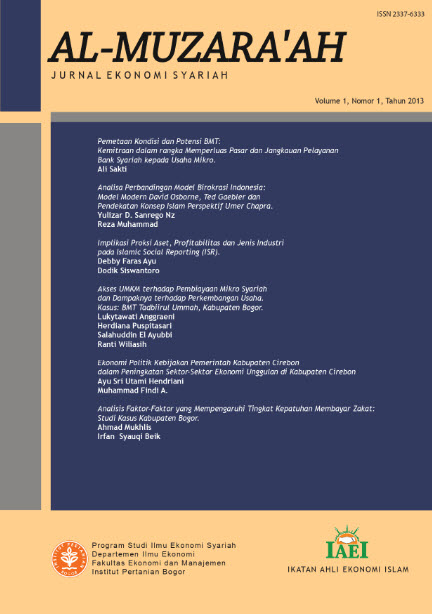Analisa Perbandingan Model Birokrasi Indonesia: Model Modern David Osborne, Ted Gaebler dan Pendekatan Konsep Islam Perspektif Umer Chapra
Main Article Content
Abstract
The inefficiency of public service in Indonesia is one of the results of bad
bureaucracy, so that the development system becomes stagnant. On the contrary, sustainable
development is a reflection of a good bureaucracy. So far Indonesia is still ranked 100th out of
182 countries in the world for corruption. This paper aims to find out the bureaucratic model in
Indonesia within the framework of modern bureaucratic model as well as Islamic Concept
approach of Chapra’s perspectives. Using content analysis, the paper found that Indonesian
bureaucracy model still embrace patrimonial concept that vulnerable to the practice of
collusion, corruption and nepotism. While the modern model of Osborne and Gaebler
Entrepreneurial Bureaucracy concept with the spirit of innovation and creativity has brought a
good change and it is in line with Islamic model of Chapra’sperspective. Chapradescribes that
the development of a country should be run simultaneously with the bureaucracy that promotes
Islamic values, moral, and hard work. It is concluded that by applying this concept,
bureaucracy in Indonesia will be more effective in removing socio-economic problem and will
come up with more efficient and sustainable development dimensions.
Downloads
Article Details

This work is licensed under a Creative Commons Attribution-ShareAlike 4.0 International License.
Author(s) who published in this journal agree to following terms:
- Authors understand and agree that copyright of manuscripts published are held by Al-Muzara'ah. The statement to release the copyright to Al-Muzara'ah is stated in form CTA (link doc).
- Copyright encompass exclusive rights to reproduce, to distribute, and to sell any part of the journal articles in all form and media.
This work is licensed under a Creative Commons Attribution-ShareAlike 4.0 International License (CC BY-SA) where Authors and Readers can copy and redistribute the material in any medium or format, as well as remix, transform, and build upon the material for any purpose, but they must give appropriate credit (cite to the article or content), provide a link to the license, and indicate if changes were made. If you remix, transform, or build upon the material, you must distribute your contributions under the same license as the original.
References
Chapra, U. 2000. Islam dan Pembangunan Ekonomi. Gema Insani Press: Jakarta.
____________2000. Islam dan Tantangan Ekonomi. Gema Insani Press: Jakarta.
Damanhuri, D. S. 2010. Ekonomi Politik da Pembangunan “Teori, Kritik, dan Solusi Bagi Indonesia dan Negara Sedang Berkembang. IPB Press: Bogor.
____________2006. Korupsi, Reformasi Birokrasi dan Masa Depan Ekonomi Indonesia. LP – FEUI: Jakarta.
____________2009. INDONESIA : Negara, Civil Society dan Pasar dalam Kemelut Globalisasi. LP – FEUI: Jakarta.
____________2008. Indonesia, Globalisasi Perekonomian & Kejahatan International. Workings Paper No. 13/A/III/2008. Guru Besar Departemen Ilmu ekonomi, Fakultas Ekonomi dan Manajemen Institut Pertanian Bogor.
Prasojo, E. dan T. Kurniawan. Reformasi Birokrasi dan Good Governance: Best Practices Dari Sejumlah Daerah. Working Paper Fak. Ilmu Sosial & Politik Universitas Indonesia. Tulisan ini dipresentasikan Dalam 5th International Simposium Journal Of Antropologi at Banjarmasin 2008.
Etzioni, E. dan Halevy. 2011. Demokrasi dan Birokrasi “Sebuah dilema Politik”. Total Media: Jakarta.
Hezam, M. O. A. Ethics Of Administration and Development In Islam : A Comparative Perspective. Journal King Saudi Univ. Vol. 14, Admin. Set (1), pp. 49 -64, Riyadh (1422/2002).
Ma’ab, M. H. dan M. Fauzan. Konsep Masyarakat Madani sebagai solusi Mewujudkan Tata Pemerintahan yang Baik. Magister Ilmu Administrasi UNSOED. Telah dipresentasikan pada Simposium Nasional Asosiasi Ilmuwan Administrasi Negara (SIMNAS ASIAN) ke – 2 di Univ. Slamet Riyadi Surakarta, pada tanggal 10 Februari 2012.
Mahmudi (Fak. Ekonomi UII). 2003. New Public Management (NPM): Pendekatan Baru Manajemen Publik. Vol. 6 No. 1, 2003. Hal: 69 – 76. ISSN : 1410 – 9018.
Sarundajang, H. 2012. Birokrasi dalam Otonomi Daerah “Upaya Mengatasi Kegagalan”. Kata Penerbit: Jakarta.
Zahrah, A. 2008. Ushul Fiqh. Pustaka Firdaus: Jakarta.

